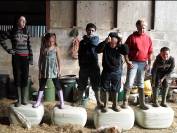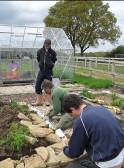Base de données des projets PDR
Care Farming in South-West England (Future Roots)
Summary
Future Roots is a 30 acre (12 ha) livestock farm with Simmental cattle, sheep, goats, chickens and pigs (plus some horticulture and other features) which is used by disadvantaged groups and other members of the local community.
Background
The Care Farm was started by Julie Plumley, with the support of her partner James O’Brien. Julie has a farming background and has had a career in social services. These experiences convinced her that the farming environment was able to offer a range of therapeutic activity which would support the development of clients and the community. She wanted them to experience the countryside and farming, and help people to use those experiences to develop themselves and their life skills.
Objective
Future Roots works with young people with autism, ADHD, Aspergers and behavioural problems to enable them to develop a better understanding of the countryside and greater self-awareness. They focus on tailoring individual activities to help people learn practical skills, team working and how to better cope with life and personal relationships - “They may not want to be a farmer, but they all learn invaluable employability and life skills".
Main activities
The Care Farm’s programmes are designed around what people need, and the farm is adapted for this. For example, both the small and large animals have been halter trained - even the cows - so that children can work with them one on one. Horticultural activities provide young people with the opportunity to learn how food is produced and to feel what it is like to nurture something. The farm also has a river and small lake, which are used for canoeing and fishing activities.
Results & Benefits
The benefits of the Care Farm include: i) Parents of children with Asperger’s have written to say: "This is fantastic – I have seen my children happy for the first time"; ii) Teachers attribute the positive changes in the young people’s behaviour and attitude to their time on the care farm, and; iii) Young people say they enjoy coming, even if they did not look forward to it at the start. They have gained qualifications and talk of the difference Future Roots has made to them.
Lessons learnt
Check first if any grant support is available. The bureaucracy of grants may put people off, but there are opportunities and people that will help. Care Farms should develop several opportunities, not just a specific activity, and establish contacts with other farmers to develop joint working. Finally, people should consider doing countryside educational visits training which can provide help in preparing farm visits and working with children.
Project location and other information
The Care Farm is located in the north west of Dorset and takes clients from across the county.
Region
South West (England)
RDP Territory
England
Total project cost (€)
143 286
EAFRD contribution (€)
71 643
National contribution (€)
71 643
Project website
Contact name
Julie Plumley
Languages for contact
English
At a glance
Country
United Kingdom
Final beneficiary type
Other
Budget range
€100 000 - €500 000
Start date:
02/11/2009
End Date:
01/11/2011
Theme / Measure:
• Rural Quality of Life & Economic Diversification
• Rural economic diversification
• 312. Support for business creation and development
Keywords:
Social inclusion, Disadvantaged people, Education, Farm diversification, Young people
Last update
13/02/2012





